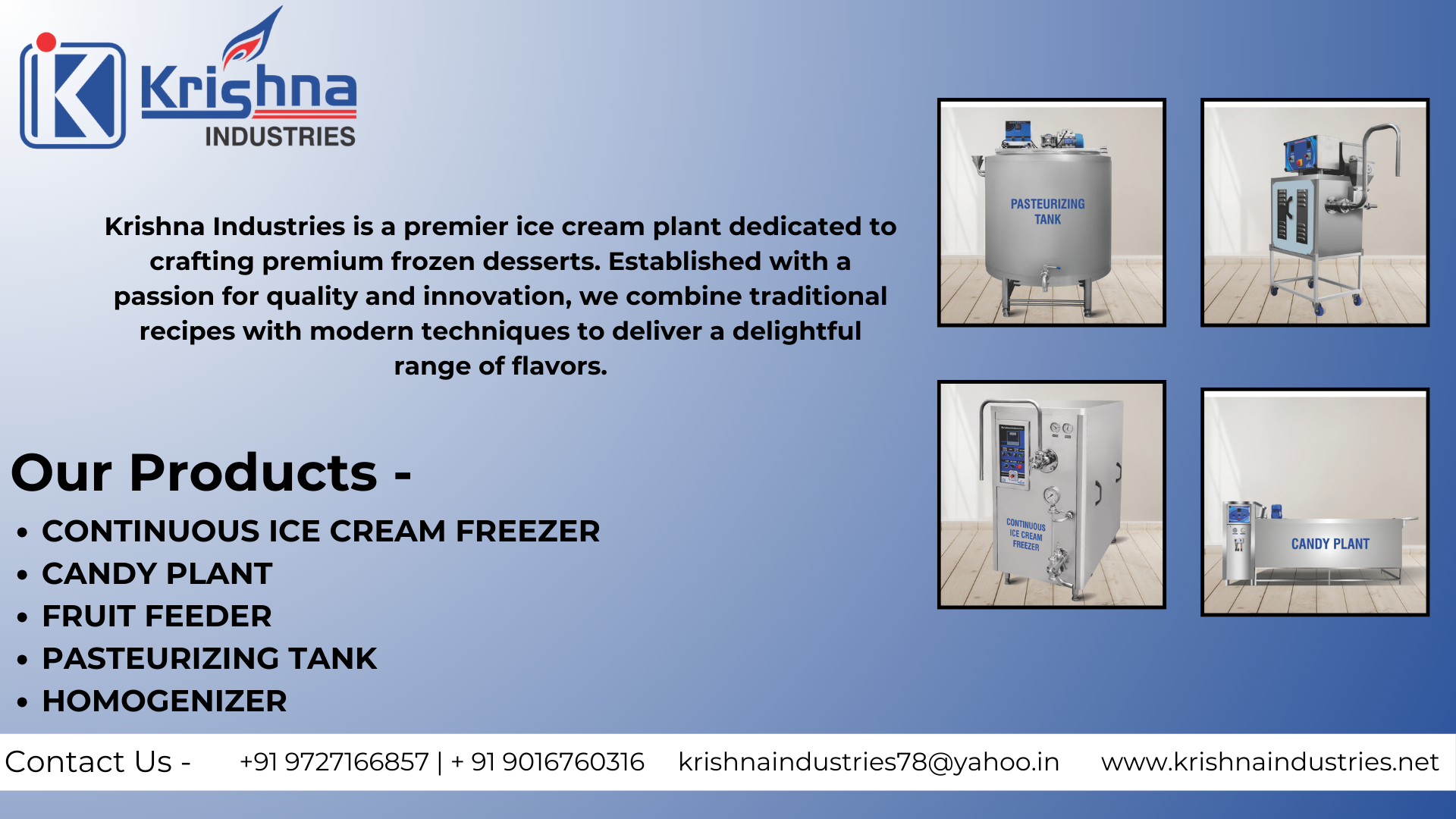Dairy Pasteurizing Machine Manufacturer
Dairy Pasteurizing Machine Manufacturer
Description
A Dairy Pasteurizing Machine is a precision-engineered device used to heat milk and dairy liquids to a specific temperature for a defined time to kill harmful microorganisms, while preserving the taste and nutritional quality. The process, known as pasteurization, is a vital step in milk processing, ensuring food safety, extended shelf life, and compliance with dairy regulations.
Manufacturers in Ahmedabad specialize in crafting durable, hygienic, and energy-efficient pasteurizing units suitable for small, medium, and large-scale dairy operations.
How It Is Made
-
Design & Planning
-
Based on capacity requirements (from 200 LPH to 10,000+ LPH).
-
CAD tools are used to design the heat exchanger layout, flow path, and control panel.
-
-
Material Selection
-
Constructed using SS 304 or SS 316L stainless steel, which is corrosion-resistant and food-grade.
-
High-quality valves, gaskets, sensors, and tubing used for safety and hygiene.
-
-
Fabrication & Assembly
-
Tubular or plate-type heat exchangers are welded and assembled.
-
Heating system integrated (steam or electric-based).
-
Equipped with temperature sensors, flow control valves, and CIP (Clean-in-Place) features.
-
-
Control Integration
-
Advanced models feature PLC-based automation with HMI touch screens.
-
Temperature control logic ensures accurate pasteurization.
-
-
Testing & Calibration
-
Machines undergo temperature mapping, leak testing, and trial runs with water/milk.
-
Confirmed to meet FSSAI, BIS, and other food-grade norms.
-
Where It Is Used
-
Dairy farms & cooperatives
-
Milk chilling centers
Cheese, curd, ghee, and flavored milk production units
-
Ice cream factories
-
Organic dairy product makers
-
Government milk schemes and milk unions
Key Features
-
Plate, tubular, or batch-type design options
-
Pasteurization range: 63°C to 90°C (depending on product)
-
Steam or electrical heating system
-
SS 304/316L construction
-
Integrated CIP system for hygiene
-
Skid-mounted for easy installation
-
Optional milk chilling and homogenization integration
-
High-quality valves, sensors, and fittings
-
Modular expansion ready for scaling up
Importance
-
Ensures consumer safety by eliminating harmful pathogens like E. coli and Salmonella
-
Helps maintain milk quality, flavor, and nutrition
-
Complies with legal food safety standards
-
Increases the shelf life of dairy products
-
Prevents milk spoilage and business losses
Advantages
-
Safe and Hygienic operation with closed-loop systems
-
Energy efficient with heat recovery options
Easy to operate with user-friendly controls
-
Long-lasting and low maintenance
-
Compatible with diverse dairy processes
-
Available in customizable sizes and types
-
Ready for integration into automated dairy plants
Significance
In India’s growing dairy sector—the world’s largest milk producer—pasteurization is no longer a choice, but a necessity. From small dairies to large cooperative unions, this machine ensures health, safety, and production excellence.
Why Choose a Manufacturer from Ahmedabad?
-
Ahmedabad is a leading engineering and dairy equipment hub
-
Proven experience with Amul model dairies and national cooperatives
-
Manufacturers offer customization, after-sales support, and on-site commissioning
-
Better pricing, local spare part availability, and quicker delivery
-
Adherence to ISO, GMP, and FSSAI standards
-
Strong ecosystem of allied components and technology partners
Top 10 FAQs
Q1. What is the working principle of the pasteurizer?
A1. It heats milk to a target temperature (e.g., 72°C for 15 seconds) and then rapidly cools it to preserve quality while eliminating pathogens.Q2. What are the types of pasteurizing machines?
A2. Plate-type, tubular-type, batch-type, and HTST (High Temperature Short Time).Q3. Can it be used for other products?
A3. Yes, for cream, juice, flavored milk, whey, and non-dairy liquids.Q4. What heating sources are supported?
A4. Electric heaters, steam boilers, or hot water generators.Q5. Is automation available?
A5. Yes, with PLC/HMI controls and auto temperature settings.Q6. How often should cleaning be done?
A6. Daily or after every production batch using the built-in CIP system.Q7. What is the material of construction?
A7. SS 304 for milk, SS 316L for acidic products or pharma use.Q8. What is the delivery time?
A8. Typically 2–4 weeks depending on customization.Q9. Is operator training provided?
A9. Yes, hands-on training and SOP manuals are provided.Q10. Can I integrate chilling with pasteurizing?
A10. Yes, many systems offer in-line chilling post-pasteurization.Conclusion
A Dairy Pasteurizing Machine from a trusted Ahmedabad-based manufacturer ensures hygienic, efficient, and regulation-compliant milk processing. Whether you are a local milk supplier or a high-capacity cooperative, this machine is the backbone of dairy safety and product quality.
Choosing a reliable Indian manufacturer means access to custom solutions, expert support, and technology that fits Indian dairy needs perfectly.
Gmail:-krishnaindustries78@yahoo.in
Website:-https://www.krishnaindustries.net/

